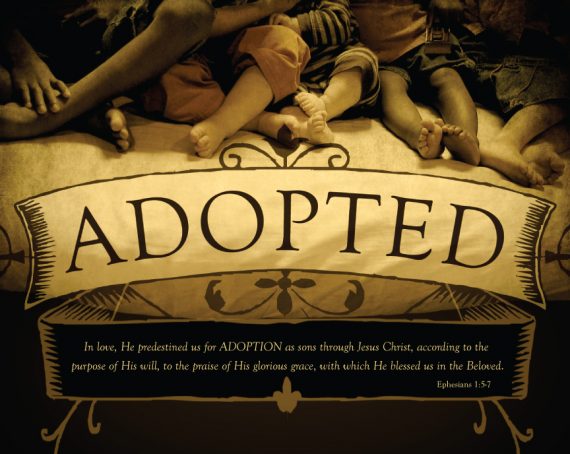The podcast episode above looks at Romans 8:17, and the video below looks at Romans 9:4. Both texts are greatly aided by a proper understanding of how adoption worked in biblical times.
Below is a recording of my first attempt at a Facebook Live video. In it, I discuss the concept of adoption from Scripture and how it helps us understand Romans 9:4.
I am definitely not an expert videographer by any means … Oh well. As mentioned in the video, the information is drawn from my Gospel Dictionary online course, specifically from the lesson on “Adoption.” Members of RedeemingGod.com can take this course for free. You can join here.
Here is a text version of what I was teaching:

Biblical Adoption
While modern adoption is when we take an orphan and adopt them into our family, this is not how adoption worked in Paul’s day.
Back then, the children who were adopted already had parents. Adoption was a way of uniting two rich and powerful families together so that one powerful family adopted the child of another powerful family. Or sometimes, a father who had multiple children would adopt one of his younger children as his heir, thereby displacing the oldest son as the heir.
So adoption was not about giving parents to those who had none, but was about naming a child (of other parents, or even one of your own children) as an heir. Adoption was about glory, honor, and privilege; not about joining a family.
Romans 9:4 and Adoption
Romans 9 is a confusing chapter. Since it is about the election and rejection of Israel for God’s purposes, many believe that Romans 9 teaches that even after we receive eternal life, if we fail to live according to God’s purposes, we either lose our eternal life or we prove we never had it in the first place.
This is, after all, what happened to Israel, is it not? No, it is not.
Election is not about how God, from eternity past, chose who would receive eternal life and who would be condemned to hell forever. Instead, election is about purpose and privilege within the plan of God (see my book, The Re-Justification of God).
It is no surprise, then, that at the beginning of this discussion of Israel’s purpose and privilege within the plan of God, Paul mentions the fact of Israel adoption by God (Rom 9:4). Paul also refers to glory, covenants, the law, service, and promises.
Right at the introduction to Romans 9, Paul shows that he is not writing about how the people of Israel were part of God’s family and then were rejected as members of His family, but is instead writing about the favored members of God’s family who have position, power, and privilege within the family because of how they live.
Though Israel began with the position of being the adopted son, they lost it through disobedience and rebellion. This is why Paul warns us, who are now in the position of adoption, that we must take heed to how we live, or else we too might be cut off (Romans 11:19-23).
This is not about losing eternal life or proving that we were never children of God, but is instead about losing out on the privileged position within the plan and purpose of God for this world.
 Understanding the Gospel requires us to properly understand the key words and terms of the Gospel. Take my course, "The Gospel Dictionary" to learn about the 52 key words of the Gospel, and hundreds of Bible passages that use these words.
Understanding the Gospel requires us to properly understand the key words and terms of the Gospel. Take my course, "The Gospel Dictionary" to learn about the 52 key words of the Gospel, and hundreds of Bible passages that use these words.
This course costs $297, but when you join the Discipleship group, you can to take the entire course for free.




Another Golden nugget of truth ,Thanks Jeremy Meyers.
As an adoptee this is an interesting post for several reasons.
The etymology of adoption ad-option, means to take by choice.
Jeremy’s description of biblical adoption is similar to the current cultural practice of adoption in Japan where most adoptees are consenting adults, the favored employees in family firms with no heir. In return for being given an inheritance within the company the adoptee adult accepts obligations to the adopter such as maintaing tombs and Shinto prayer rites.
In the modern West adoptees themselves are often highly critical of current practices that leave many adoptees extremely wounded souls without acknowledgement and permission to show their grief, and thus without knowledge and access to support and healing therapies.
Adoption hides the child’s lived experience: abandonment. The baby or child suffers the loss of birthmother, father and their entire kin ties, at an age when they are totally dependent and lacking in mature understanding and resilience. Abandoned babies suffer huge pre-language trauma. Adoptees almost always have emotional and relationship problems that damage their entire lives.
The rarely told truth is that adoptees commit suicide four times above the general population rate.
Christians, I”m afraid, can be just as blind to adoptee suffering as the wider society. On one Christian adopter’s blog the blond adopting mother explained how she told her black african adoptee daughter that God had performed a little miracle, helping her pay for the adoption with donations from the church. What a way to confuse the child and embitter them towards God. Children don’t want to be adopted, they want their own parents, their own kin, their own culture, not a let’s pretend we are family.
Thank you Jeremy for allowing my message concerning adoption to be posted above, the voice of adoptees critical of adoption practices is rarely allowed to be heard outside the adoptee community, especially by abandoning mothers and adopting parents. As you personally traveled down the road to adopting a child, and sound very hurt by your disappointment, I can only say I’m amazed you allowed my message to be posted. Your tolerance and respect for another voice is really to your credit.
Apologies too, for the several typos and possibly hard to follow references in my post above. For example, I mentioned that for a baby adoptee the trauma is pre-language, which means the baby feels the abandonment but is unable to process their feelings consciously, the trauma is stored subconsciously below their awareness and therefore is often never recognized or treated.
I wonder if the Bible says anything about how a community ought to care and nurture an abandoned or orphaned child. We really need a model that supports the maintenance of kin ties as much as much as possible rather than favoring stranger adoption.
Sorry if I’m distracting from your explanation of what the cultural practice of biblical adoption actually was like. It’s very interesting.
Thank you.
nice. planning to share adoption in church and your discussion is a great help.
🔥
buying your book now!
In Roman Law, if one is adopted into a family, that one received a new name, old debts were forgiven, any criminal or unlawful activity was pardoned, and the adopted one could never be un-adopted. This is how Paul identifies our standing as God’s adopted children.